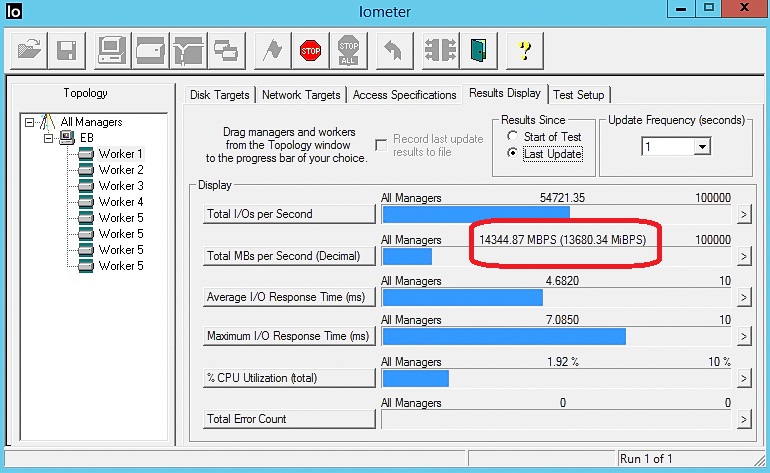IOMETER BENCHMARK VER. 1.1.0
Seeing things as sporadic as they were in the last few tests, we thought it important to close with some IOMeter testing and we were rather surprised. These aren’t steady state results and nothing more than an effort to see just how high we could get. Enjoy!
READ THROUGHPUT – 14GB/s
WRITE THROUGHPUT – 15GB/s
4K RANDOM READ IOPS – 2.1 MIL
4K RANDOM WRITE IOPS – 1.9 MIL
REPORT SUMMARY AND FINAL THOUGHTS
Nothing whatsoever needs to be said of performance and scaling when we see the single DCP1000 at 7GB/s jump to 14GB/s when two drives are set up in RAID. This is exactly the same when we see IOPS jump from 1 million to 2 million. This is a monster drive and definitely the SSD for those builders looking for an NVMe SSD capable of extreme performance.
In fact, Kingston and Liqid have had such success with the DCP1000 NVMe PCIe 3 SSD that they have set up their own website with a ton more information, interviews and tests at kingston.liqid.com. Beware though, you just may get hooked!
 The SSD Review The Worlds Dedicated SSD Education and Review Resource |
The SSD Review The Worlds Dedicated SSD Education and Review Resource | 


this is insane…. @intel shame on your optane!
“we use a set length of 256mb” sb 256MB “and test both the read and write performance of various transfer sizes ranging from 0.5 to 8192kb.” sb 8192kB.
Is it possible to boot from this RAID?
No. The only way to boot from this device is to use a single drive as the boot drive and the remaining three in RAID; the speed of which is very similar to these tests.
not even with Intel VROC or this “WS C621E SAGE
“Motherboard?
VROC doesn’t work and, unless you can find a way to get a UEFI to recognize the RAID, it simply can’t be done. That feature is not part of the drive, where it may be with others. Any of the individual four SSDs can boot from that drive when not in RAID mode.